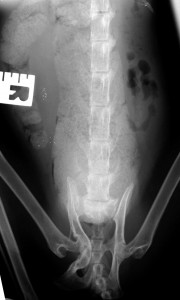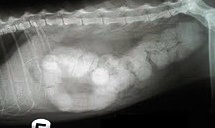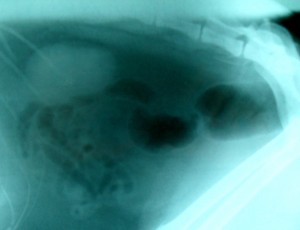Cats can have great difficulty passing faeces through a narrowed pelvis, resulting from pelvic fractures left to heal naturally after trauma from road traffic accidents etc.
This can lead to chronic and progressive constipation months and even years after the trauma. A build-up of faeces in the colon – the large bowel – occurs. The colon stores faeces and resorbs water from it, so the faecal accumulation becomes drier and drier, and harder and harder. Once the colon has been stretched beyond certain limits, it loses its ability to recover contractile function, and the constipation is irreversible. The options are either regular enemas – expensive and not without risk – or colectomy (surgical removal of most of the large bowel).
A large section of the large bowel is cut away, and the remaining ends are sutured together to recreate the tubular integrity of the gut. Colectomy is usually performed in a way that saves the junction between the small intestine and the large intestine. This makes it much less likely that incontinence of sloppy faeces will be an issue post-operatively. Colectomy is a serious surgery, and we always warn owners that there is a small but significant risk of peri-operative death. If the gut repair fails, then life-threatening peritonitis (inflammation and infection of the body cavity) results.
16th November 2013





